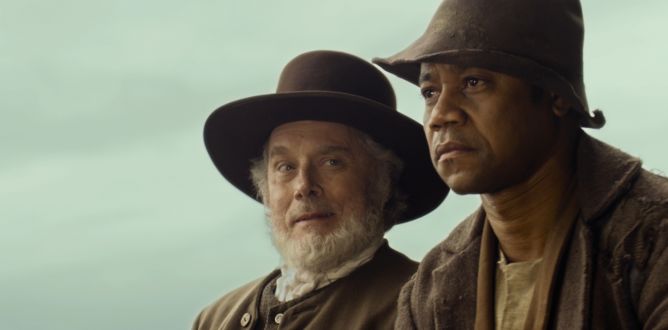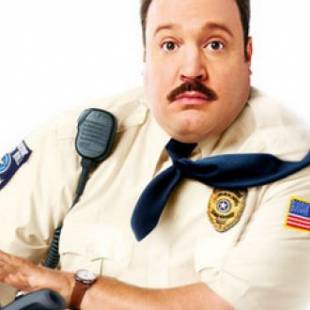Freedom Parent Guide
This ambitious production's propensity to stumble into sentimentality may mean that viewers will enjoy it most if they are willing to overlook such shortcomings.
Parent Movie Review
Samuel Woodward (Cuba Gooding Jr.) has been a slave all his life. Although his mother Adira (Phyllis Bash) has tried to help him find peace through Christianity and music, Samuel refuses to be comforted. Rather he urges the old woman, along with his wife Vanessa and son Jim (Sharron Leal and Aaron Bantum), to flee via the Underground Railroad—which consists of a series of citizens sympathetic to the abolition of slavery. These individuals are willing to risk their own lives by escorting runaways to Canada where the practice of human bondage is illegal.
So one dark night in 1856, the Woodward’s set off, knowing full well their master, Jefferson Monroe (David Rasche) will send out a search party as soon as he discovers they are missing. Despite the danger, Samuel puts his trust in his fellow slave Big Hand (Phillip Boykin) and his friend’s connection to the secret network. His family instead places their faith in God, seeing the willingness of the self-sacrificing strangers as evidence of the Lord’s divine care. As they undertake the perilous journey from Richmond, Virginia to the USA’s northern boarder, the elderly Adira takes the opportunity to share her religious convictions with her doubting son by telling Samuel the story of his great-grandfather.
In 1748 a frightened boy named Fassena (Travaris Spears) was captured amongst many other Africans, and packed into a crowded ship bound for America. The vessel’s Captain, John Newton (Bernhard Forcher), at first ignores the conditions endured by the human cargo chained in the bowels of the boat. But his own past experience as the recipient of abuse while a common seaman, along with a friendship he develops with a black servant (Jubilant Sykes) who acts as an interrupter between the slaves and the crew, eventually opens Newton’s eyes. He is particularly moved by the plight of Fassena and during a life-threatening storm entrusts the child with his copy of the Bible. The book remains with the youth, offering solace as he begins his difficult life in the new world. The eventful voyage also sparks a conversion to higher principles for Newton, who goes on to pen the words to Amazing Grace. (While the movie uses its fair share of artistic license, it is based on the facts generally acknowledged as the inspiration for the beloved hymn.)
A rendition of that classic, plus several other traditional tunes, punctuates the telling of this tale. Having characters occasionally break into song seems a bit strange (even though these sequences never include choreographed dancing), yet somehow the placement of the music in the context of the story proves to be rather moving. For instance, after a slave is whipped, the suffering man pleads, “Swing low, sweet chariot—coming for to carry me home.” And “Sometimes I Feel Like a Motherless Child,” accompanies a youngster witnessing his only family member being buried at sea.
Surprisingly, this independent production received an R from the MPAA. Likely the rating is a result of depictions of inhuman treatment of others, as well as a manhunt that results in a couple of on-screen shootings (shown with blood effects). While these portrayals will likely be too upsetting for children, they are still relatively sanitized, and are similar to type of violence in PG-13 fare. Certainly these scenes are nowhere near as intense as those found in the film 12 Years A Slave, which received the same restrictive label.
Despite the warning, the film’s greatest disappointment for viewers may lay with the plot’s propensity to stumble into sentimentality. Even strong performances and a well-known lead (Cuba Gooding Jr.) can’t quite make up for the feeling the script is trying too hard. The ambitious production attempts to promote racial empathy, include historical characters (like John Newton, the legendry Underground Railroad station master Thomas Garrett - played by Michael Goodwin, and Black activist Frederick Douglass - played by Byron Utley), and inspire faith. This does not mean audiences should stay away from this movie brimming with good intentions—only that they will enjoy it most if they are willing to overlook such shortcomings.
Directed by Peter Cousens. Starring Cuba Gooding Jr., Sharon Leal, David Rasche, William Sadler, Bernhard Forcher, Anna Sims, Michael Goodwin, Terrence Mann. Running time: 98 minutes. Theatrical release June 5, 2015. Updated July 17, 2017
Freedom
Rating & Content Info
Why is Freedom rated R? Freedom is rated R by the MPAA for some violence.
Freedom is opening in limited release on June 5, 2015.
Violence: Pen and ink drawings of naked slaves are shown. Slaves live in fear of their masters. Characters are in constant peril. Slaves are shackled, sometimes with collars around their necks. Men with guns and dogs hunt down escaped slaves. A slave who is tied to a post and whipped (the beating and bloody wounds are shown) wishes he could die. Another man attempts suicide. The slave trade is depicted, with African men, women and children being branded, then chained together and packed into the cargo hold of a small ship. Deplorable living conditions cause sickness to spread among the captives - some die and are buried at sea. A storm threatens to sink a ship and the passengers aboard. The corpse of a hanged man is shown. Characters are threatened with guns, knives and other weapons, and some are shot—these killings are shown on screen with some blood effects. Fistfights are portrayed. Caring citizens put themselves at risk by helping escaped slaves to hide and find transportation to freedom.
Sexual Content: Men talk about a master who fathered an illegitimate child with a slave woman. Couples kiss. A buxom woman is seen in a corset. Some other characters are scantily dressed.
Language: Infrequent mild and moderate profanities are used.
Alcohol / Drug Use: A character smokes a cigar. Characters drink alcohol.
ping the slaves deal with the injustices and inhumanities they were forced to endure? Can those tools still help people dealing with life’s challenges?From the Studio: Two men separated by 100 years are united in their search for freedom. In 1856 a slave, Samuel Woodward and his family, escape from the Monroe Plantation near Richmond, Virginia. A secret network of ordinary people known as the Underground Railroad guide the family on their journey north to Canada. They are relentlessly pursued by the notorious slave hunter Plimpton. Hunted like a dog and haunted by the unthinkable suffering he and his forbears have endured, Samuel is forced to decide between revenge or freedom. 100 years earlier in 1748, John Newton the Captain of a slave trader sails from Africa with a cargo of slaves, bound for America. On board is Samuel’s great grandfather whose survival is tied to the fate of Captain Newton. The voyage changes Newton’s life forever and he creates a legacy that will inspire Samuel and the lives of millions for generations to come. © ARC Entertainment
Page last updated July 17, 2017
Freedom Parents' Guide
Talk about the movie with your family…
How did music and religion play a vital role in helping the slaves deal with the injustices and inhumanities they were forced to endure? Can those tools still help people dealing with life’s challenges?
Learn more about:
John Newton - Captain of a ship involved in the slave trade, who later became a preacher and a hymn writer.
The history behind the hymn, Amazing Grace.
Thomas Garrett – A Quaker who became a “station master” for the Underground Railroad.
Frederick Douglass - A former slave who became an advocate for the abolition of slavery.
Home Video
The most recent home video release of Freedom movie is July 14, 2015. Here are some details…
Freedom releases to home video (DVD) on July 14, 2015.
Related home video titles:
The movie Amazing Grace tells of the political fight to end slavery in England. Although she is raised in a life of privilege, a young black girl still wrestles to find true equality in the film Belle. A family’s historyof enslavement is told in the mini-series Roots.


